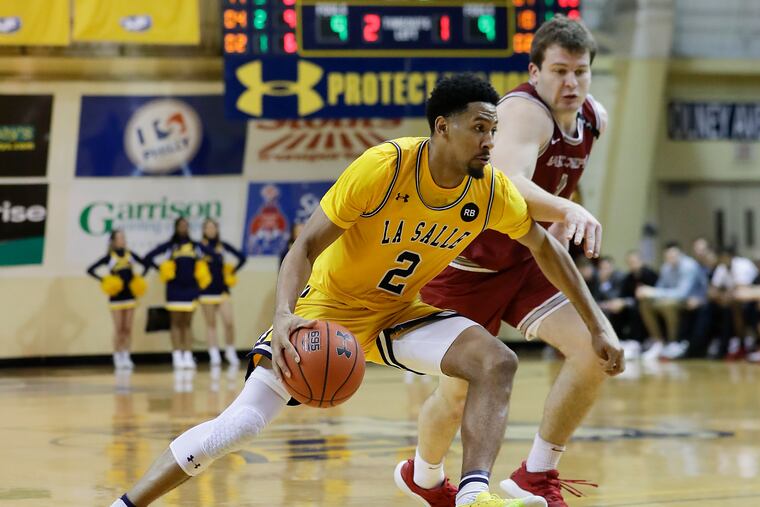NCAA Division I decisions show that nobody knows how basketball season will play out | Mike Jensen
It's a vote of no-confidence, in advance, that all the plans for basketball and other sports will result in a season free from more big impact from COVID-19.

On Wednesday, the NCAA’s Division I Council voted to extend eligibility for this year’s winter-sport athletes, acting as if this coming season isn’t even happening for eligibility purposes.
How to read that: a vote of no-confidence, in advance, that all the plans for basketball and other sports will result in a season free from more big impact from COVID-19.
"The pandemic will continue to impact winter sport seasons in ways we can’t predict,'' said Penn athletic director Grace Calhoun, chair of the D-1 council, in the statement announcing the decision. “The actions today ensure the continuation of local decision-making in the best interest of each institution and its student-athletes.”
The council also has moved on another proposal long in the making. It has introduced what it is calling a “uniform blanket transfer exception,” allowing transfers to not sit out a year. One time only. You can’t transfer every year without sitting out. There will be a vote in January, the rule going into effect for 2021-22. Expect it to pass.
On its face, the transfer rule makes all sorts of sense. Other students, non-athletes, obviously can transfer without penalty, why not athletes? The NCAA, under great pressure on this front, has been granting waivers allowing instant eligibility in an increasing number of cases. Coaches can leave for other jobs, often more lucrative ones. Only fair to allow players to do the same.
Here’s the thing. There are consequences to these changes. You can’t even call them unintended consequences. They are all obvious in advance. Forget the impact on your favorite program or on coaches. That’s all cost-of-doing-business stuff.
But imagine you’re a sophomore D-I basketball player, ready to move into a starting role. Not so fast. You won’t know one year to the next whether there is playing time or even a roster spot for you. You’ll have to examine your own options every single year.
Let’s get back to the pandemic-relief waiver. There is nothing in the announcement language that guarantees anybody an extra year of scholarship money. We’ve seen with fall sports, those decisions vary by school. If you don’t think some programs will handle it based on performance, you’ve lost focus here.
“Extra year is going to affect your team dynamics,” said one veteran Division I assistant coach. “Recruiting, scholarship numbers, and younger players who feel it’s their turn may leave.”
As for the transfer rule …
“Instant transfer will entice those younger players who you’ve developed to find larger platforms,” the coach said.
That’s an intended consequence, to be honest. Let players who developed late find their proper level. If you don’t think coaches are already factoring that into recruiting decisions, you’re nuts.
“I’ve talked to many coaches on all levels,” the veteran assistant said, relating what another coach told him: “I’m not recruiting any high school players — waiting to see what falls from the tree.”
“It will allow high majors to basically recruit our team at the end of each season," another assistant, at a low- to mid-major, said of the transfer change.
For the high school class of 2021, all these changes kind of come together. You’re heading to college next year. All of a sudden, nobody is leaving. Plus transfers may come in and be instantly eligible at the college you committed to maybe when you were a high school junior. Many are predicting that prep schools that specialize in basketball will be packed next year.
It won’t impact everyone. Not the big boys. Villanova and Virginia will keep on selling that it will develop players long-term for the NBA. Kentucky can keep pitching its one-and-lottery ideal.
Even lower down, there is some good in these decisions this week.
“At our level, the extra year is a great benefit for us,” the low-to-mid assistant said of adding the year of eligibility. “We have five seniors. Don’t think it would be fair for them to have their last season be like this.”
A personal belief: The NCAA too quickly dismissed a proposal by Atlantic Coast Conference coaches that every team be eligible this season for the NCAA Tournament. Actually selecting a field could turn out to be a nightmare. Letting everyone in provides everyone something significant in this year where rewards are few and far between all over society.
Of course, having every team participating in March Madness assumes all teams can even start their seasons and keep playing until March. The D-I council just passed a no-confidence vote on that working out smoothly across the board. Only way to read it.